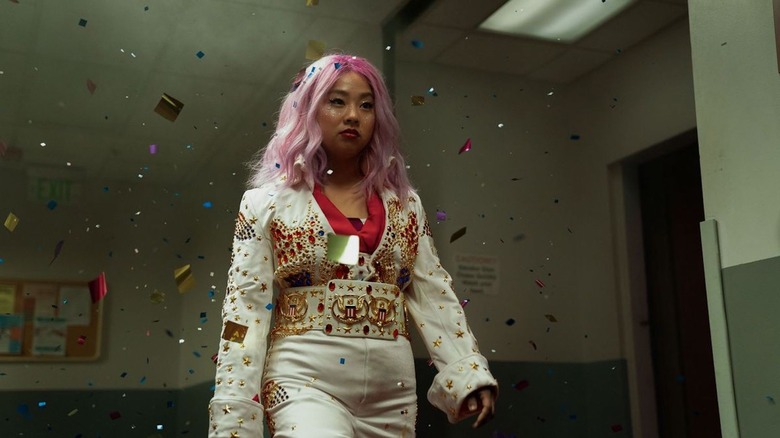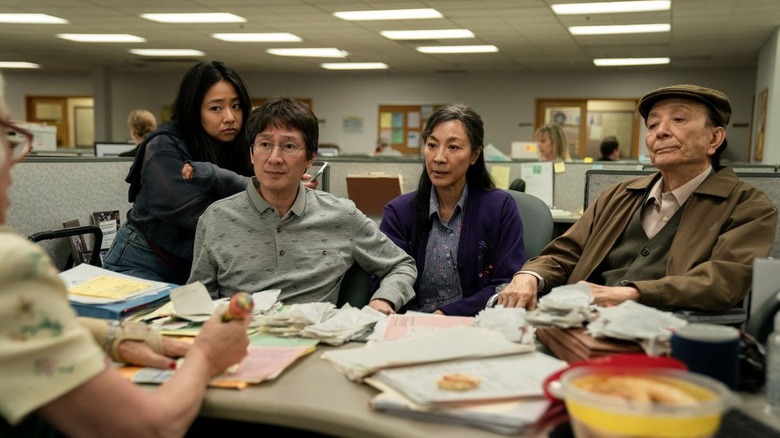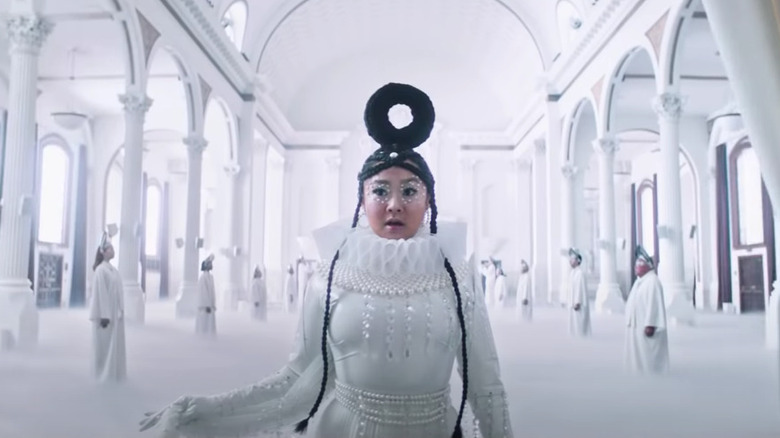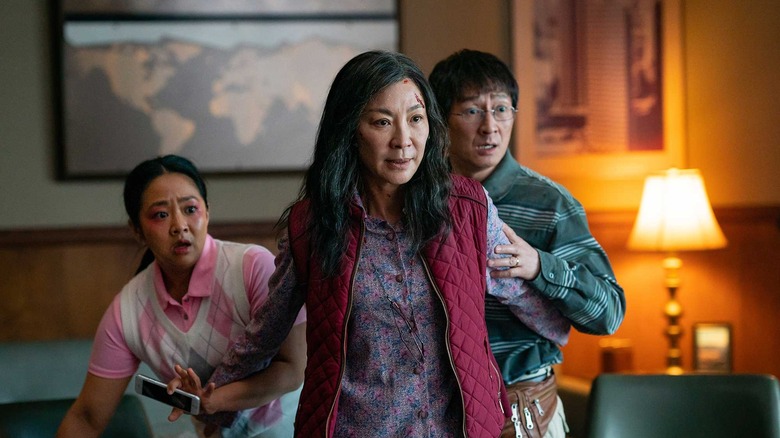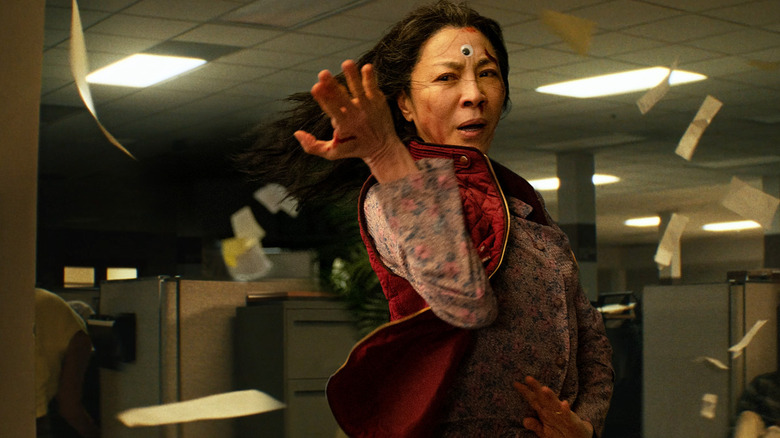Stephanie Hsu On Being Split In Two In Everything Everywhere All At Once [Interview]
Stephanie Hsu has a tricky balancing act in "Everything Everywhere All At Once." She plays Joy, the daughter of Michelle Yeoh's Evelyn, a lesbian who is on the outs with her traditional, splintering family. And in Daniels' gonzo, mind-melting multiverse adventure, Joy herself is splintering. This results in Hsu having to play both ally and antagonist to Yeoh, an already daunting task for any 31-year-old actress in her first major leading role in a feature film. But Hsu took one lesson from the cinema icon to help her play the part: having a binder.
"Michelle has a legendary binder [to keep track of the story]," Hsu told me in a Zoom interview ahead of the release of "Everything Everywhere All at Once." "But I had a very similar binder where I mapped out the entire story and sort of did this weaving of Joy and Jobu and when they meet in the middle."
I sat down with Hsu to talk about playing the dual roles in "Everything Everywhere All at Once," wearing dozens of fabulous costumes, and what it's like to live in two worlds — both thematically and in real life — as a child of immigrants.
Mild spoilers for "Everything Everywhere All at Once" follow.
'Once we started all our hands were just in it and I trusted the Daniels so much.'
"Everything Everywhere All at Once" is so rapid fire, so fast paced. Was there ever a moment while filming it that you felt lost or like you didn't know where you were?
No, because I think I did a lot of homework. Michelle has a legendary binder that if you haven't talked to Michelle, yet you should ask her about. But I had a very similar binder where I mapped out the entire story and sort of did this weaving of Joy and Jobu and when they meet in the middle. And I also felt like I don't know, once we started all our hands were just in it and I trusted the Daniels so much. And the Daniels always know what they're doing. Even when they don't know what they're doing, they understood the story so deeply that I feel like we all kept each other tethered to the same thread of the story.
Because even as crazy as everything gets, the through line is still the story of this family that's trying to find one another. So I think we all just like those little leashes that babies in New York, they like walk in two little duckies.
Yes.
And they all hold on to the same center rope. I feel like we are all like that. And the Daniels were like our little captains.
So there are an incredible amounts of cuts and costume changes and storylines and worlds many, which we only see for a fraction of a second. Were there any scenes or sequences that you wish got to play out in full, in the film?
Well, I do want to take a second and just celebrate Paul Rogers, who's our editor. He did such an excellent meticulous job and he had a hard, hard task, but he did it so beautifully. And really, you can feel his work in the film. So I just want to give a little shout out. There was a lot of Jobu stuff that ended up not making the film because the film is long and we really went crazy. So there was a lot of even crazier stuff that we did that I'm really happy that we streamlined the story. But I'm also grateful because I feel like there's a lot more weird in me and I can't wait for the next project to get to show even more weird. Because when we were filming it, I was like, "Oh no, if I do everything, then I'll have nothing left." But I have still so much left.
But one of my favorite lines of the movie that was cut is Jobu says to Evelyn, "There's no wrong, no right. Only wronght." And I love that line so much. And I honestly think about it all the time. When someone's like, "You can't do that. That's wrong or that's not right." I'm like, wait, "No, there is no wrong. There is no right. There's only wronght. Like everything is meaningless and, we're making it all up. We can carve this life in our communities, how we choose. And what we were told has to be, does not necessarily have to be." So, that's a R.I.P.
'Why do I still care so deeply about these people?'
So this movie has such a large scope of things that it's dealing with in terms of the philosophical and terms of the very dumb and silly. And it does it all with this sort of language that a lot of millennials will recognize, especially on the big screen, both visually and thematically. So while you were making this film, was that exciting to have directors who spoke a very similar sort of visual language with you?
Yeah. I mean, I think that the experience of it being so fractured has a lot to do with how it's edited. But when we're filming it we're playing the scenes from beginning, middle to end all the way through. And I think the reason why this movie works is, as weird as things get, no matter the crazy things we're wearing, no matter like the hot dog fingers, everyone is still rooted in the same story, which is just about a family trying to find one another. And so, I think that was the bedrock of chaos. And why somehow even when you're being splintered off into different realities as an audience member, you're like, "Why do I still care so deeply about these people?"
So that is just to say, when we were filming it, we weren't thinking about the internet. We weren't thinking about the chaos. We were just living every reality truly and to the full extent. So hot dog fingers, they're really just in a world where they happen to love each other and they happen to have hot dogs for fingers. I am dressed as Elvis, but I'm not doing an Elvis impression. I'm still Jobu or still Joy inside Jobu, who just happens to be dressed this way. And it's just living the realities as truthfully, as we can, as if they are just like you and me talking on this interview right now.
Let's talk about those dual roles that you play of Joy and Jobu Tupaki. What was it like to balance those two extremely different roles and to often ricochet between those roles within the same scene?
Yeah. One of my favorite nuggets that the Daniels and I created my favorite part about making a film is that you make shorthand, right? If you're in a really collaborative process, you have code words with your creatives and you create a vocabulary. And we created this third character, called "Joybu," which is when Jobu and Joy combine. And so that was a thing that we would often use and pull out of our pockets where we would do one scene, like a Jobu scene as Jobu. And then we would do it again as Joy. And then we would do it again as Joybu and just kind of exploring what all those textures mean.
And I think that was a part of the map that I was also drawing for myself is like, I knew that the film was going to end in the parking lot and have that cathartic moment. So who do we meet when we meet Joy? Who do we meet when we meet Jobu? And as the movie builds when do they start kind of becoming the same person? And ultimately Jobu, I think, even though she's chaotic and wears all these crazy costumes, I think you can feel in the movie that it's still Joy in there. It's still, this daughter who's really lost and has despair and desperately trying to get through, but can't. It's still her in there.
And I think that's what made the process of developing Jobu, so difficult actually, and very complex because she's not just a villain or a bad guy, it's way more complex than that. It's still rooted in a person who has very simple needs and just wants to be loved by her mother, you know? And we worked a lot on making sure that Jobu didn't feel cliche and have a scary voice or just did bad things, but that everything was still rooted from this place of being Joy.
'To be a daughter of an immigrant and trying to prove yourself worthy or have a life for yourself...'
So there's so much more in this movie about the Asian diaspora experience than I had anticipated, seeing. The rift between Joy and her sort of old world parents and grandparents and the healing of generational trauma at the end, especially in that parking lot scene. Would you say that the division between Joy and Jobu is kind of akin to what some second or third generation immigrant children have in trying to balance the two worlds that they live in?
Mm, wow, that's a beautiful question. I feel like the splintering between Joy and Jobu is not generational. Like it's not Joy is second, Jobu's third or something. I think, it feels more to me like a millennial question of like, "What is this world we are living in? It is so chaotic. It is so scary. It is so hard to find meaning sometimes when everything feels like it's crumbling." And Jobu just does that to the nth degree. She kind of goes like, "Well, if it is going to be this crazy and confusing, I'm going to blow it up even more. And if nothing matters, then watch what I can do."
So I think for Joy and Jobu, it's less about generation between them and more about this really, I feel like it is a very, I'm a millennials, and so are the Daniels. But it does feel like a very millennial kind of question. And then of course there is the generation thing between Michelle or Evelyn and Gong Gong and Joy. And that distance is very real. I think people don't realize how hard it is to immigrate to a country where they are not valued. And then, to be a daughter of an immigrant and trying to prove yourself worthy or have a life for yourself when your surroundings have kind of taught you that we don't my matter or we are less than. That's not like a topic that is ever... That's not a line in the movie, but I think that is present, right? They own a laundromat.
I mean, I think that's a really key part of who they are. It isn't Michelle Yeoh, it's Evelyn Wong who owns a laundromat and they're just trying to make ends meet. And they have clients like Big Nose or Jenny Slate who are really, really rude to them and treat them like they're not worth anything. People aren't really talking about their socioeconomic status, but I think that is a part of what people are really connecting to in the film.
Because it's like most people who go to the movies are not movie stars. Most people who go to the movies are just regular people who want to hear a story that makes them feel seen. And I think this movie really succeeds in showing the story of an immigrant family or an every man, every woman, and also showing that they're extraordinary. And then of course the movie ends in the IRS building and it's like, "This is the life we've got. It's beautiful and messy and imperfect, but it's just the one that we have. So we're going to make the most of it."
That's wonderfully said.
Thanks.
'We like to throw paint at the wall and be messy.'
I want to talk a little bit about playing Jobu and sort of that embodiment of nihilism that she is. And how the movie is really about pulling her back from the brink and showing that there's a reason for existing for a living. What was it like to just sort of play that and to play that simultaneously with what Joy was going through?
Yeah. I was saying earlier, I tend to be very picky about what I say yes and no to, because I really believe in the transference of energy. And if I'm going to do something, a role is going to take a part of me. And I'm also going to give something to it, but it's also definitely going to take a part of me. And then whatever the film is or whatever the final product is, people are also going to receive that energy. And so if it's going to put bad stuff into the world, I don't think we need more badness right now. I want to make things that leave people feeling like they have hope or that they can go out back into their lives and be better people.
But it's been two years since we filmed this movie. And this was my first kind of big feature, and I really gave my all to this project. And I think back on it now, and I really realize, even though Jobu is super playful and weird, it's still always from a place of like joy, which is that Joy the character and this thought of like this really being at the edge of the brink and really feeling like there's nothing to live for.
And so, even being funny while coming from that place was really dark. And I look back on it now and I can really understand. I think it was really heavy. Even though it was the best project I've ever worked on and I got to do it with all of my friends, I was definitely trying to carry that throughout the whole process of filming because I knew it couldn't just be silly for no reason. It had to be silly from a place of darkness and despair.
So I like to pretend or I like to think that I'm not a "typical actor" sometimes. And I'm not like a method actor, but I really understand why people play roles and it really weighs on them. It takes a toll. Because as artists, there's no boundary, you're just going to give yourself to the thing that you're passionate about. You can't be like, "Well, I'm only going to give a little bit of it." You're going to give it all because you care and you're a portal and your job is to express and share.
And there's so much of Joy and Jobu that is so vulnerable that I think it was difficult. It was emotionally challenging. But on the other side is, we shot the parking lot scene at the last week. It's one of our last days of filming. And I think that scene was able to happen because all of us had experienced the whole movie together. We had lived the family, we had done the scenes as a family. We had done the fight scenes, so we had lived the chaos. And so that moment of catharsis was also coming from this history that we all then had with one another in that short period of filming.
Yeah, and also I think I am someone. And I think this either Daniels and I get along, we like to throw paint at the wall and be messy. And the first time I watched the final cut and I saw the parking lot scene, I was like, "Wow. I was really just letting it all, hang out." People in Hollywood, they pretty cry all the time. I'm just like full-on ugly crying. And it's not about the tears. It's about, I just remember that there was something about that scene that I really connected to, and I didn't want to shy away from the messiness of the feeling and the ugliness of the feeling. I wanted to be as honest as possible and doing that is scary. So, that's the long-winded answer.
"Everything Everywhere All At Once" is playing in theaters now.
